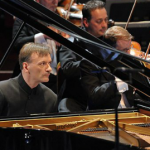“There is a well-worn saying: practice makes perfect. I don’t believe this, at least in reference to playing the piano: abstract “perfection” is rarely what we seek; but good practising makes it more likely that we will give a good performance. Its attention, its concentration, its tightening of the screws enable the concert experience to take wing in freedom.”
The following article by Stephen Hough appears in the November/December issue of International Piano magazine. For full, free access to the other articles in that issue see here. It is reprinted in the Daily Telegraph’s music column.
More on the BBC website – Thanks to Oren Myers for this
One of my favourite pianists Stephen Hough quotes his teacher, Gordon Green, who used to say, “in practise a perfectionist, in performance a realist“. In other words, prepare assiduously, tirelessly at home, but when onstage accept the situation at hand.
His article looks at practice from several points of view:
- Study – Decode the message behind the notation
- Finger – “When starting to learn a piece I always write in fingerings. It aids memory, it emphasises the act of study, it discourages a sloppy “sight-read till ready” attitude, it forestalls nerves in a performance, it personalises the score.”
- Dissect – We need to know what might go wrong in a performance and why. There is no such thing as a difficult piece. There are merely moments in pieces which are problematic.
- Slow – Slow practice can be a complete waste of time if the mind is not working quickly.
- Audience – There are two dangers to avoid in practising, firstly not to play as if you’re on stage, filling the hours crashing through pieces without improvement. But the second, more subtle danger is not to get stuck in a practising mode.
- Mind – As important as it is to have strong fingers – muscles, tendons, joints loose and lithe – we need a strong mind too. Strong in concentration, on and off stage; ever striving for improvement, but relaxed when none seems to take place;
[hr]
Stephen Hough has also created a great iPad app called the Liszt Sonata, which allows the music to be viewed from any perspective – there is a magical graphical view of the score as well as the score itself, and an in depth analysis of the piece.

